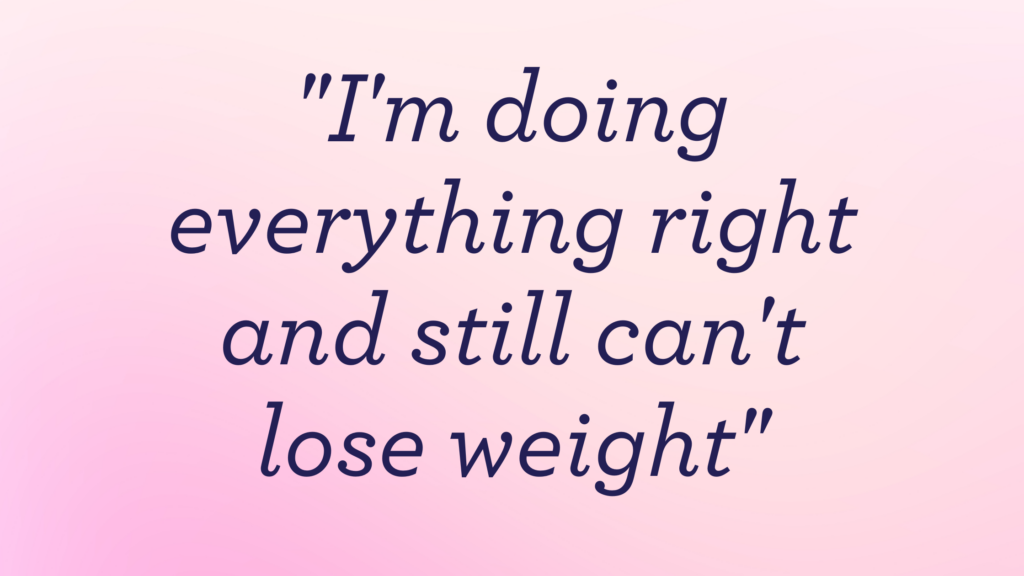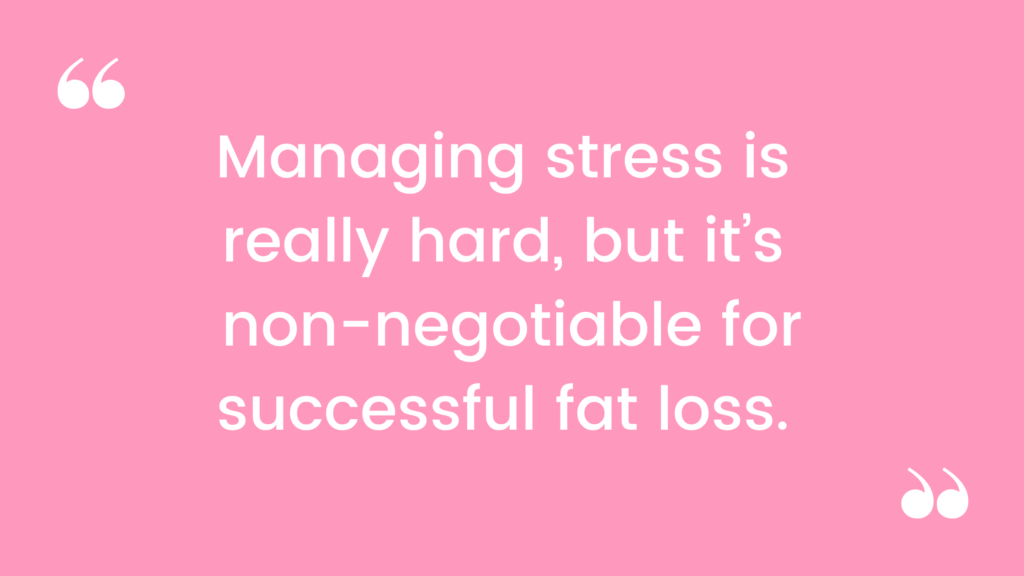
“I’m doing everything right and still can’t lose weight”

As a Registered Dietitian, this is honestly probably the most common thing I run into with women. They feel like they are doing EVERYTHING and nothing is changing with their weight.
Listen. I hear you. I get it.
There is nothing more frustrating than working your butt off with good nutrition and getting in your workouts for the scale to literally not budge at all. Or maybe even go up!
So, then your efforts start to fizzle because you’re like, “what’s the point?”
Depending on who I’m talking to about weight loss, there are 6 common things I will ask and talk about with them to better understand what’s going on. I think these might really help you too, so let’s get into it:
1. Are you a candidate for weight loss in the first place?
I know this question kind of sucks, but it’s really important to ask yourself. “Is my body in a place to respond to weight loss behaviors?” Not everyone is a candidate for weight loss right at this moment.
Who would not necessarily be in a place to lose weight?
- You have been undereating for a long time (fewer than 1500 calories for more than 6 months)
- You know you have some hormonal imbalances
- Your stress levels have been out of control for a long time and you’re experiencing burnout
- You have gut dysbiosis (things are off with your gut health)
- Poor thyroid function/suppressed thyroid
- If you have a big life stressor coming up (pregnancy, postpartum or breastfeeding, divorce, job or career change, moving)
- Flared autoimmune
- Disordered eating behaviors
If you’re struggling to lose weight but potentially have one or more of these situations also going on, you probably need to take a step back and provide your body with the proper repair and support first.
Good news: all of these situations can be supported through our VIP 1:1 coaching program. We have a variety of Registered Dietitians and Functional Nutrition Health Coaches at the ready to help you navigate your repair journey.
2. Are you just focusing on the scale?
I wish I had a dollar for every time a client of mine was frustrated about the scale, but then when they went to take progress pictures or measurements, they saw some huge improvement!
Your scale weight doesn’t and will never tell the full story about your health or body composition. It just tells us your gravitation pull onto the earth. It can certainly be used as a tool, but it definitely cannot be the only thing you’re looking at.
Do you really care the most about your weight? Or do you care about how good you feel in your clothes and how good you look naked? I can also bet your labs at your annual doctor’s appointment also mean something to you too.
Before you go down the rabbit hole of “nothing is working,” make sure to broaden your horizons on your markers of success.
3. Are you eating enough?
If you’re being really diligent about your weight loss goal by keeping your calories under 1,800 calories, I am not surprised at all that you’re not losing weight.
Most women, especially those of reproductive age, need 2,000 calories or more a day to function optimally. Yes, 2,000 or more. Definitely more if you are regularly exercising with strength training.
Think about it: why would your body go above and beyond to help you burn fat if it’s not getting its basic needs met on a daily basis? It doesn’t have enough gas on the fire to even do that in the first place.
I know it’s really scary to think about eating more food, but it’s the only way to bring your metabolic rate back up and put you in a position to be able to lose body fat.
This process is often referred to as reverse dieting, and I talk about more in this post.
4. Are you going too hard on your workout routine?
It can be a reflex almost to bump up your workouts when trying to lose weight – especially those that really work up a sweat like OrangeTheory Fitness, HIIT workouts, and running.
The thing I run into a lot with women doing this though is that they are not giving their bodies enough rest to truly benefit from their efforts. Rest days are absolutely critical and if you’re not fitting those into your routine, of course your efforts are stalled. Read more about rest days here.
The other big issue is that they aren’t prioritizing strength training enough. Instead of focusing so much on getting in a high calorie burn, it’s really helpful to shift the focus to putting your muscle on your body.
While strength training workouts don’t have a super high calorie burn during the workout, the calorie burn throughout the entire day after the fact is significant. The calorie burn during a long run is pretty high, but the burn afterward is low.
More muscle on the body also directly increases our metabolic rate. Higher metabolic rate = more body fat burned.
If you’re hitting the high-intensity workouts 5+ days a week, try pulling back to 3-4 days. Decrease your HIIT workouts to 2 times a week or fewer and add a strength training day. Go to OTF once a week and add more low-intensity movement like walking. Any of these tweaks will be helpful for your efforts.
5. Are you taking your stress levels seriously enough?

When you think about stress, it’s natural to think about food and movement first, but I would argue that stress should be at the top of your radar.
How are your stress levels day to day? Like really. How are they?
Are you living in “fight or flight” mode all the time? Living off high cortisol levels? Shallow breathing all day without ever stopping for 5 minutes to take some deep breaths?
Do you do things for yourself (and only you) at least once per day? Do you ask for help when you need it? Do you say no to things that you do not have the capacity for?
Managing stress is really hard, but it’s non-negotiable for successful fat loss.
Think of it like this. When we are stressed, cortisol levels are chronically higher and the body views this as a danger. It’s like a mini fire in the body or a form of inflammation. The body does not feel safe when we are constantly living life at 100 mph and never signaling to the body that things are actually ok. Why would the body burn fat from the body when it feels unsafe? Simply put, it’s not going to. Or at least it’s going to make it superrrr difficult for you.
If you’re working really hard to lose weight but you’re not reflecting on how you manage your stress every day, you absolutely need to spend time in this area.
The first step is going to be taking things out of your “stress bucket.”
- Toxic friends
- Watching the news
- Phone notifications
- Doom scrolling
- Lack of boundaries
- A job you hate
- Saying yes to everything
- Doing things you hate that you don’t have to do in the first or could outsource instead
The second step in increasing your stress resiliency (because life is always going to have stressors):
- Breathwork
- Meditation
- Journaling
- Brain dumping
- Reading for fun
- Walking in nature
- Talking with a friend
- Getting more sleep
- More rest days
- Yoga
- A hobby you love
6. Are you giving yourself enough time?
Ok, the last thing you need to consider is if you’re giving yourself a realistic enough timetable.
If you’re feeling like nothing you do works for weight loss, but you’re only 30 days in….you’re not giving yourself enough time.
I know it seems like it should be enough time because that’s all we’ve known. All the programs and diets we might have done in the past were anywhere from 10 days, to 21 days, to 30 days, am I right?
The truth is that successful long-term weight loss takes several months. Up to a year. Even longer. If you can stop thinking about this as a temporary project and think about it as your body that you live the rest of your life you’ll be able to create a lifestyle you can truly stick to.
Because the things you’re doing to see weight loss should be things you can do for the rest of your life. That’s why we work with our VIP 1:1 clients for a minimum of 4 months. Weight loss strategies that work take time and consistency.
If you went through all of the above and you’re still feeling like you’re doing everything and still not seeing results, then it’s time to recruit a metabolism expert to help. Our VIP 1:1 coaching team has practitioners with a variety of specialties to help you push past this weight loss resistance you’re experiencing.
Focuses include:
- Refeeding the metabolism back up to optimal function
- Digging deeper with function nutrition testing
- Peri- and post-menopause support
- Pregnancy and postpartum support
- Mindset support (ditching the all-or-nothing thinking and self-sabotage)
Sometimes it’s not a matter of “doing everything right.” It’s a matter of knowing what your unique body needs because we are not one size fits all with a weight loss strategy. It is so much more than just eating fewer calories and burning more calories.
If you’re sick of struggling with this on your own, fill out a VIP 1:1 application today and our team will follow up with you with the best coach for you.
You got this!
Coach Elle

